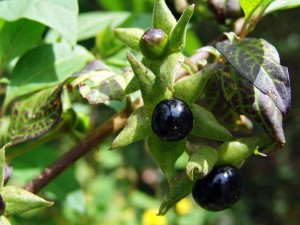Belladonna is a plant. The leaf and root are used to make medicine.
The name “belladonna” means “beautiful lady,” and was chosen because of a risky practice in Italy. The belladonna berry juice was used historically in Italy to enlarge the pupils of women, giving them a striking appearance. This was not a good idea, because belladonna can be poisonous.
Contents
Uses
- Though widely regarded as unsafe, belladonna is used as a sedative, to stop bronchial spasms in asthma and whooping cough, and as a cold and hay fever remedy. It is also used for Parkinson’s disease, colic, motion sickness, and as a painkiller.
- Belladonna is used in ointments that are applied to the skin for joint pain (rheumatism), leg pain caused by a disc in the backbone pushing on the sciatic nerve (sciatica), and nerve pain (neuralgia). Belladonna is also used in plasters (medicine-filled gauze applied to the skin) for treating psychiatric disorders, a behavior disorder called hyperkinesis, excessive sweating (hyperhidrosis), and bronchial asthma.
- Rectally, belladonna is used in hemorrhoid suppositories.
Benefits
-
- There are various unclear scientific evidences relating to the health benefits of belladonna. However more research is required in these fields to prove the safety and effectiveness of belladonna.
- Belladonna can reduce the amount of mucus production and relax the air passage in the lungs.Belladonna is also used as a headache cure, for ear infection, irritable bowel syndrome, correct the nervous system disorders, and decrease PMS symptoms and menopausal symptoms (hot flashes).
- Besides these there are various health conditions like acute infections, anxiety, arthritis, hemorrhoids, hay fever, gout, diverticulitis, kidney stones, measles, mumps, muscle spasm, short bowel syndrome, stomach ulcers, sore throat, tooth ache and many more, but there is no scientific evidence to prove these benefits.
Cautions
Pregnancy and breast-feeding: Belladonna is LIKELY UNSAFE when taken by mouth during pregnancy. Belladonna contains potentially toxic chemicals and has been linked to reports of serious side effects. Belladonna is also LIKELY UNSAFE during breast-feeding. It can reduce milk production and also passes into breast milk.
Congestive heart failure (CHF): Belladonna might cause rapid heartbeat (tachycardia) and might make CHF worse.
Constipation: Belladonna might make constipation worse.
Down syndrome: People with Down syndrome might be extra-sensitive to the potentially toxic chemicals in belladonna and their harmful effects.
Esophageal reflux: Belladonna might make esophageal reflux worse.
Fever: Belladonna might increase the risk of overheating in people with fever.
Stomach ulcers: Belladonna might make stomach ulcers worse.
Gastrointestinal (GI) tract infections: Belladonna might slow emptying of the intestine, causing retention of bacteria and viruses that can cause infection.
Gastrointestinal (GI) tract blockage: Belladonna might make obstructive GI tract diseases (including atony, paralytic ileus, and stenosis) worse.
Hiatal hernia: Belladonna might make hiatal hernia worse.
High blood pressure: Taking large amounts of belladona can increase blood pressure. This might make blood pressure become too high in people with high blood pressure.
Narrow-angle glaucoma: Belladonna might make narrow-angle glaucoma worse.
Psychiatric disorders. Taking larga mounts of belladonna might worsen psychiatric disorders.
Rapid heartbeat (tachycardia): Belladonna might make rapid heartbeat worse.
Ulcerative colitis: Belladonna might promote complications of ulcerative colitis.
Difficulty urinating (urinary retention): Belladonna might make this urinary retention worse.
Interactions
- Drying medications (Anticholinergic drugs) interacts with BELLADONNA
Belladonna contains chemicals that cause a drying effect. It also affects the brain and heart. Drying medications called anticholinergic drugs can also cause these effects. Taking belladonna and drying medications together might cause side effects including dry skin, dizziness, low blood pressure, fast heart beat, and other serious side effects.Some of these drying medications include atropine, scopolamine, and some medications used for allergies (antihistamines), and for depression (antidepressants).
Other names
Atropa belladonna, Atropa acuminata, Baccifère, Belladona, Belladone, Belle-Dame, Belle-Galante, Bouton Noir, Cerise du Diable, Cerise Enragée, Cerise d’Espagne, Deadly Nightshade, Devil’s Cherries, Devil’s Herb, Divale, Dwale, Dwayberry, Grande Morelle, Great Morel, Guigne de la Côte, Herbe à la Mort, Herbe du Diable, Indian Belladonna, Morelle Furieuse, Naughty Man’s Cherries, Poison Black Cherries, Suchi
References
Source:
Diet health club, http://www.diethealthclub.com/dietary-supplements/belladonna.html

